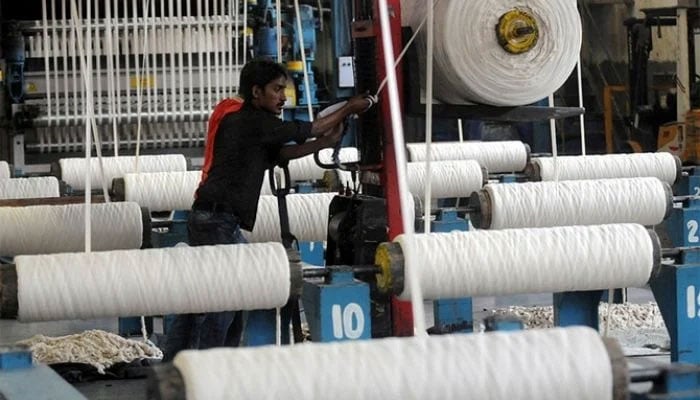APTMA says textile exports may fall below $1bn/month from Jan 2023
KARACHI: The All-Pakistan Textile Mills Association (APTMA) on Friday said the country’s textile exports could fall below $1 billion a month from 2023 onwards, seeking government intervention to save the sector from destruction.
“Across the country, the textile industry is currently using less than 50 percent of its capacity. If corrective action is not done quickly, a very significant number of jobs have already been lost and many more will do so.”
In a letter written to the prime minister, APTMA said that the textile sector was now operating at capacity utilisation of less than 50 percent across the country. “A very substantial number of jobs have already been lost and many more are to follow if remedial measures are not urgently undertaken,” APTMA cautioned.
Attributing the problems to supply chain disruptions due to floods, it said that the cotton crop was destroyed, and only 5 million bales were produced this year, whereas the industry requires 14 million bales. In addition to that, it said the forex issues have curtailed cotton import and other essential inputs necessary for exports.
Dollar shortage had also increased the cost by 20 percent due to demurrage /detention and delays and loss of and failure to book orders due to uncertain and delayed turnaround time for export orders.
APTMA said that the currency depreciated 60 percent within the last year with no corresponding increase in working capital facilities. A much higher quantum of funds was stuck with the work in progress as a consequence of 17 percent sales tax and devaluation on all inputs.
The association urged the government to restore SRO 1125 and zero-rating for the textile value chain, while collecting sales tax on domestic sales at the point of sale. It demanded immediate refund of all deferred sales tax, tuff and other dues and extension in submission date of duty drawback claims for FY21.
“A new export sector working capital lending facility be established catering to EOU sectors at subsidised rates to tide over the current crisis,” it asked.
APTMA said export oriented units were be under immense pressure as they were unable to generate funds to service debt.
“This will lead to massive defaults, further curtailment of capacity and a possible banking crisis.”
It demanded moratorium on capital repayment from July 1, 2022 to June 30, 2023. It said that gas/RLNG being supplied to Punjab was priced at $9 of the average consumption of mills last year.
This formula irrationally excludes the new plants/expansion that have been made during the last 2 years. Gas/RLNG supply to Sindh export industry was supplied at $3.75/ MMBTU (Rs840) and at a quantity meeting 80 percent plus requirements.
This was contrary to the commitment that differential in gas/RLNG pricing within the country would be less than $2 to keep Punjab industry competitive.
This huge differential means that Punjab-based industry is paying for gas at $9 and electricity at Rs19.99/kwh while bulk of Sindh industry is generating their own electricity at 4 cents/kwh. Given this differential, Punjab-based industries were no longer viable and have no option but to close down, APTMA said.
It sought implementation of weighted average cost of gas while extending RCET across the country to enable new industrial units, expansions and Punjab-based industry to compete. It also asked the government to give first priority to the export industry in gas/RLNG supply. “Allow competitive tariffs to all new projects and expansions,” it demanded.
-
 Prince Harry Warns Meghan Markle To 'step Back'
Prince Harry Warns Meghan Markle To 'step Back' -
 Selena Gomez Explains Why She Thought Lupus Was 'life-or-death'
Selena Gomez Explains Why She Thought Lupus Was 'life-or-death' -
 New Zealand Flood Crisis: State Of Emergency Declared As North Island Braces For More Storms
New Zealand Flood Crisis: State Of Emergency Declared As North Island Braces For More Storms -
 Nancy Guthrie Case: Mystery Deepens As Unknown DNA Found At Property
Nancy Guthrie Case: Mystery Deepens As Unknown DNA Found At Property -
 James Van Der Beek's Brother Breaks Silence On Actor's Tragic Death
James Van Der Beek's Brother Breaks Silence On Actor's Tragic Death -
 Megan Thee Stallion On New Romance With Klay Thompson: 'I'm Comfy'
Megan Thee Stallion On New Romance With Klay Thompson: 'I'm Comfy' -
 Nicole Kidman Celebrates Galentine’s Day Months After Keith Urban Split
Nicole Kidman Celebrates Galentine’s Day Months After Keith Urban Split -
 Justin Bieber Unveils Hailey Bieber As First Face Of SKYLRK In Intimate Campaign Debut
Justin Bieber Unveils Hailey Bieber As First Face Of SKYLRK In Intimate Campaign Debut -
 Caitlin O’Connor Says Fiance Joe Manganiello Has Changed Valentine’s Day For Her
Caitlin O’Connor Says Fiance Joe Manganiello Has Changed Valentine’s Day For Her -
 Rachel Zoe Sends Out Message For Womne With Her Post-divorce Diamond Ring
Rachel Zoe Sends Out Message For Womne With Her Post-divorce Diamond Ring -
 James Van Der Beek's Final Conversation With Director Roger Avary Laid Bare: 'We Cried'
James Van Der Beek's Final Conversation With Director Roger Avary Laid Bare: 'We Cried' -
 Jaden Smith Walks Out Of Interview After Kanye West Question At Film Premiere
Jaden Smith Walks Out Of Interview After Kanye West Question At Film Premiere -
 Michelle Obama Gets Candid About Spontaneous Decision At Piercings Tattoo
Michelle Obama Gets Candid About Spontaneous Decision At Piercings Tattoo -
 Why Halle Berry Wasn't Ready For Marriage After Van Hunt Popped Question? Source
Why Halle Berry Wasn't Ready For Marriage After Van Hunt Popped Question? Source -
 Bunnie Xo Shares Raw Confession After Year-long IVF Struggle
Bunnie Xo Shares Raw Confession After Year-long IVF Struggle -
 Brooks Nader Reveals Why She Quit Fillers After Years
Brooks Nader Reveals Why She Quit Fillers After Years




